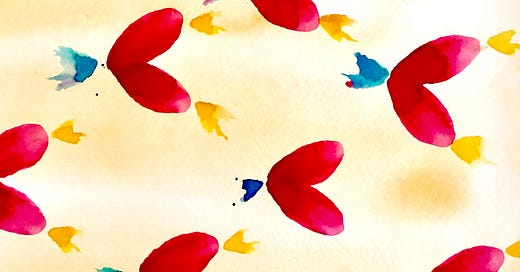There are a million suggestions out there for how to manage our time. Our purpose here is to know what works for you to make sure your artist has space in your life.
I’ll share a few things that have worked for me and my clients and then invite you to write down your artist’s prescription for ‘time management.’
Lower your expectations
Sometimes I think my company should be called ‘Lower the Bar.’ Having unreachable expectations for ourselves and our output is not benign. Thinking we should do more, that we have more time than we do, that we can do more in a short period of time keeps us in a perpectual ‘behind’ position. I want you to know that stress is optional!
Please lower your expectations about how much you can focus, how much you can get done. Do the following calculation to get real about your available time. This is not the place to be a time optimist*!
Time magic
Use my magic trick to identify how much time you actually have. Okay, it’s not really a magic trick, more of a math exercise. But it works to help lower expectations.
If you set a deadline to have something done by the end of the month, take out your calendar. Subtract days when you won’t be working on your project, such as weekends, full work days, or days when you have something special like visitors or travel. Then, add up the days you do have.
This is a sobering exercise. When I do this, I usually have 10-14 days of actual work rather than a ‘month’ or 30 days. I like this sobering effect. It forces me to:
recalibrate how much I can do.
show up for the days I do have
rarely feel behind even when there is a lot of work to do
not disillision myself that I have more time than I actually do.
I did this mid-June for my mid-September novel deadline. That’s three months, right? But when I added up my available days, including weekends, I only had 53 days to work on the novel. Yikes! That galvanized me. Some people might feel more pressure with this method. Don’t let it. Just use it to get real and get focused.
Sneak up on yourself
I’ve written about this elsewhere, and it’s one of my favorite ways to get things done. As mentioned, we often think we need a lot of time to get into the flow. We might have exacting conditions that must be met to get into it with our artist. There are often things we can do to move our project along in short bursts of time.
When you have 10-15 minutes between things, chances are you do what I do. You’ll open email or social media and bop around. This further fragments your focus. It rarely prepares you or gives you any kind of positive energy you can use for the next thing. Instead of soaking up others’ energy, devote these pockets of time to your own creative power.
‘Sneaking up on myself’ can look like this:
I have my project document open in a tab and pop over to write a few lines.
I visit my list of research or ‘tasky’ stuff that I can handle in a few minutes.
I use brief blops of time to reflect on challenges or unanswered questions in my work.
I keep my sketchbook open and nearby to make some doodles or add color to an illustration.
I completely get that you may truly and really and deeply need longer stretches of time to get into it with your artist. I do, too. And I also suspect that there are ways to connect with your art and move things forward.
Try mini-retreats
The dream of a weekend retreat or even a whole day to focus on our project is an aspiration many of us share. If you can schedule one or several of those on your calendar and guard it, and show up for it, that is most splendid.
Typically, we don’t always have that luxury. But we can take what I call mini-retreats. For me, this is a half day. I am writing this on a mini-retreat. It’s Friday morning and I have nothing else on the schedule. I’ve satisfied my other obligations and I have a burning desire to make a lot of progress today. I used to love going to cafes to get focused writing time. But now, I no longer like the loud music and small workspace.
So I set myself up at home with my coffee, my pitcher of water and my meditative music that holds my writing sprints. I closed my studio door so I’m not tempted to interact with my husband, who also has a home office.
What would a mini-retreat look like for you?
This section is not to convince you that you should do things my way. I want you to challenge any notion that has presented a barrier between you and your creative satisfaction. Entertain the notion that something may have changed.
INVITATION
Write down what you know already works for you and your artist to get together. Now get current about what’s true about you, your artist, and your time. With that information, you will know what works for you now. What needs updating? Perhaps try something new this week.
Affirmation: I easily make time to connect with my artist.
In the comments: Tell us one thing that works for you to make time even in a busy schedule.






Gosh, Cynthia, this is extremely helpful. Thank you!
I may have to rethink my plan after last night. I will have to keep my mind busy and focused. I can't afford to have a breakdown in mental health again like I did in 2016-2019.